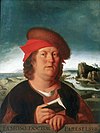Paracelsianism
Appearance

Paracelsianism was a medical movement based on the theories and therapies of Paracelsus. It was prominent in late-16th and 17th century Europe and represented one of the most comprehensive alternatives to learned medicine, the traditional system of therapeutics derived from Galenic physiology. Based on the principle of maintaining harmony between the microcosm, Man; and macrocosm, Nature; Paracelsianism fell rapidly into decline in the later 17th century, but left its mark on medical practices; it was responsible for the widespread introduction of mineral therapies and several other formerly esoteric techniques.
Sources
- Allen George Debus. The English Paracelsians. University Of Chicago Press, 1968. (original publication 1965)
- Allen George Debus. The French Paracelsians. Cambridge University Press, 2002. (original publication 1991)
- Didier Kahn, Alchimie et paracelsisme en France à la fin de la Renaissance (1567-1625) [Cahiers d’Humanisme et Renaissance 80]. Geneva: Droz, 2007.
- Wilhelm Kühlmann and Joachim Telle, eds. Corpus Paracelsisticum: Dokumente frühneuzeitlicher Naturphilosophie in Deutschland. Tübingen: Max Niemeyer, 2001-.
- Jole Shackelford. A Philosophical Path for Paracelsian Medicine: The Ideas, Intellectual Context, and Influence of Petrus Severinus (1540/2-1602). Copenhagen: Museum Tusculanum Press, 2004.
